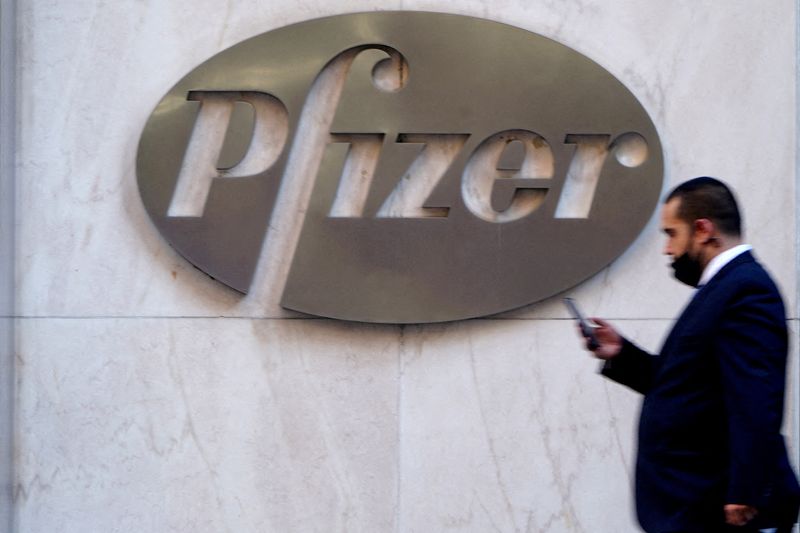By Manas Mishra and Michael Erman
(Reuters) -Pfizer said on Friday it would not advance a twice-daily version of oral weight-loss drug danuglipron into late-stage studies after most patients dropped out of its midstage trial with high rates of side effects such as nausea and vomiting, and its shares fell 5%.
Pfizer (NYSE:PFE) has a once-daily version of the weight-loss pill still in the development. It hopes a change in the drug's release mechanism can reduce side effects, but early data on the new formulation will not be available until the first half of next year.
The decision is a setback to the U.S. drugmaker's ambition of tapping into a booming obesity market that analysts expect to be worth $100 billion by the end of the decade.
Danuglipron belongs to the same class of injected diabetes and obesity treatments as Novo Nordisk (CSE:NOVOb)'s Wegovy and Ozempic and Eli Lilly (NYSE:LLY)'s Mounjaro and Zepbound, known as GLP-1 agonists, that are already bringing in billions of dollars.
GLP-1s, originally developed for type 2 diabetes, mimic the action of the GLP-1 hormone to regulate blood sugar, slow digestion and suppress appetite.
Lilly and Novo are in late-stage development with oral versions of their respective drugs. Novo has said it expects to file for approval of a high-dose oral version of its compound semaglutide this year, and Lilly expects its version to launch in 2025.
Eli Lilly shares were up slightly, while shares of Novo Nordisk erased an earlier 1% loss and were about flat following the Pfizer news.
Several analysts said it was unclear whether the reformulated version of Pfizer's drug would have a better tolerability profile for patients.
The once-daily version may keep some hopes alive for Pfizer's obesity strategy, Barclays (LON:BARC) analyst Carter Gould said in a note, but "it's increasingly apparent the company will have to look to external assets to deliver on the market opportunity it had portrayed."
Pfizer said the drug cut weight by as much as 13% at 32 weeks in adults with obesity and without type 2 diabetes in a mid-stage trial. That compares with 15% for Eli Lilly's experimental oral drug at 36 weeks at a high dose.
Pfizer characterized the side effects in the twice-daily version study as mild, but the rates were high with more than half of those on the drug dropping out compared with discontinuation rate of about 40% for the placebo group.
Meanwhile, tiny Altimmune, which has a market value of less than $200 million, said late on Thursday that its experimental obesity drug helped reduce weight by as much as 15.6% at 48 weeks in a mid-stage trial of 391 patients. It's shares were up more than 45% at $4.61.
Danuglipron is among the most high-profile medicines in Pfizer's drug development pipeline as it works to replace lost revenue from slumping demand for its COVID-19 vaccine and treatment.
The company's shares are down more than 40% this year, due in part to falling sales of its COVID products and investor concerns about potential competition for several of its top-selling drugs.
Pfizer announced a $3.5 billion cost-cutting program in October, but has yet to disclose many specific details on the planned cuts.
Pfizer CEO Albert Bourla has said an obesity pill could eventually be a $10-billion-a-year product for the drugmaker.
"Overall, this is a worse-than-anticipated outcome for a program that was already playing catch-up," said TD Cowen analyst Steve Scala in a note to clients.
